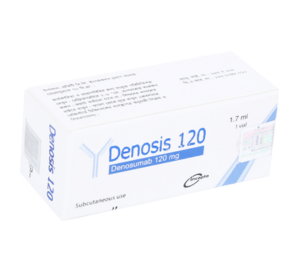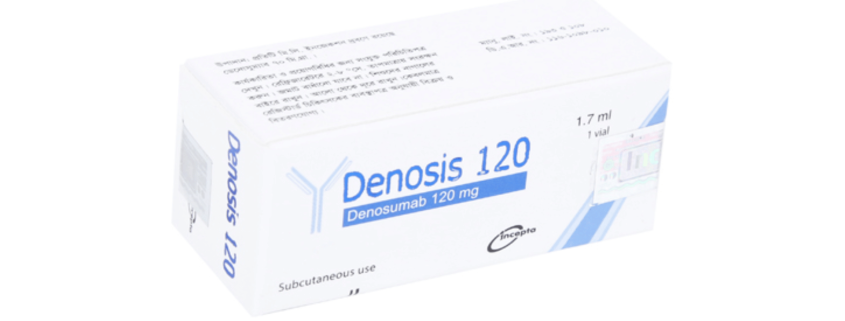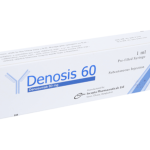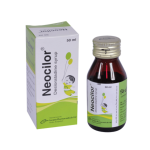Denosis 120(Denosumab)

Therapeutic Group: Monoclonal Antibody
Presentation
Denosis 120: Each ml solution for injection contains Denosumab 70 mg.
Description
Denosumab is a human IgG2 monoclonal antibody with affinity and specificity for human RANKL (receptor activator of nuclear factor kappa-B ligand). Denosumab binds to RANKL, a transmembrane or soluble protein essential for the formation, function, and survival of osteoclasts, the cells responsible for bone resorption. Denosumab prevents RANKL from activating its receptor, RANK, on the surface of osteoclasts and their precursors. Prevention of the RANKL/RANK interaction inhibits osteoclast formation, function, and survival, thereby decreasing bone resorption and increasing bone mass and strength in both cortical and trabecular bone.
Indications
Denosumab is a RANK ligand (RANKL) inhibitor indicated for:
– Prevention of skeletal-related events in patients with bone metastases from solid tumors
– Treatment of adults and skeletally mature adolescents with giant cell tumor of bone that is unresectable or where surgical resection is likely to result in severe morbidity
– Treatment of hypercalcemia of malignancy refractory to bisphosphonate therapy
Dosage & Administration
Denosumab is intended for subcutaneous route only and should not be administered intravenously, intramuscularly, or intradermally.
Bone Metastasis from Solid Tumors : The recommended dose of Denosumab is 120 mg administered as a subcutaneous injection every 4 weeks in the upper arm, upper thigh, or abdomen. Calcium and vitamin D should be administered as necessary to treat or prevent hypocalcemia.
Limitations of use
It is not indicated for the prevention of skeletal-related events in patients with multiple myeloma.
Giant Cell Tumor of Bone: The recommended dose of Denosumab is 120 mg administered every 4 weeks with additional 120 mg doses on Days 8 and 15 of the first month of therapy. It should be administered subcutaneously in the upper arm, upper thigh, or abdomen. Calcium and vitamin D should be administered as necessary to treat or prevent hypocalcemia.
Hypercalcemia of Malignancy : The recommended dose of Denosumab is 120 mg administered every 4 weeks with additional 120 mg doses on Days 8 and 15 of the first month of therapy. It should be administered subcutaneously in the upper arm, upper thigh, or abdomen.
Side Effects
Bone Metastasis from Solid Tumors: Most common adverse reactions (per-patient incidence greater than or equal to 25%) were fatigue/asthenia, hypophosphatemia, and nausea
– Giant Cell Tumor of Bone: Most common adverse reactions (per-patient incidence greater than or equal to 10%) were arthralgia, headache, nausea, back pain, fatigue, and pain in extremity
– Hypercalcemia of Malignancy: Adverse reactions in greater than 20% of patients were nausea, dyspnea, decreased appetite, headache, peripheral edema, vomiting, anemia, constipation, and diarrhea
Precautions
Same Active Ingredient: Patients receiving Denosumab 120 mg should not receive Denosumab 60 mg
– Hypersensitivity including anaphylactic reactions may occur. If an anaphylactic or other clinically significant allergic reaction occurs, appropriate therapy should be initiated and Denosumab therapy permanently discontinued
– Hypocalcemia: Must be corrected before initiating Denosumab. May worsen, especially in patients with renal impairment. Patients should be adequately supplemented with calcium and vitamin D
– Osteonecrosis of the jaw: Has been reported with Denosumab. Patients should be monitored for symptoms. An oral examination should be performed and symptoms should be monitored.
– Invasive dental procedure should be avoided during treatment with Denosumab
– Atypical femoral fractures: Have been reported. Patients with thigh or groin pain should be evaluated to rule out a femoral fracture
– Embryo-Fetal Toxicity: Denosumab can cause fetal harm when administered to a pregnant woman
Use in Pregnancy & Lactation
Pregnancy Category D. Denosumab can cause fetal harm when administered to a pregnant woman. Women should be advised not to become pregnant when taking Denosumab.
Lactation:
It is not known whether Denosumab is excreted in human milk. Because many drugs are excreted in human milk and because of the potential for serious adverse reactions in nursing infants from Denosumab, a decision should be made whether to discontinue nursing or discontinue the drug, taking into account the importance of the drug to the mother.
Pediatric Use:
The safety and efficacy of Denosumab have not been established in pediatric patients except in skeletally mature adolescents with giant cell tumor of bone. Denosumab is recommended only for treatment of skeletally mature adolescents with giant cell tumor of bone.
Geriatric Use:
No overall differences in safety or efficacy were observed between these patients and younger patients.
Renal Impairment:
Greater risk of developing hypocalcemia was observed with increasing renal impairment, and with inadequate/no calcium supplementation.
Use in females:
Patients are advised to contact their healthcare provider if they become pregnant, or a pregnancy is suspected, during treatment or within 5 months after the last dose of Denosumab.
Use in males:
The extent to which denosumab is present in seminal fluid is unknown. There is potential for fetal exposure to denosumab when a male treated with denosumab has unprotected sexual intercourse with a pregnant partner. Males should be advised of this potential risk.
Drug Interaction
No formal drug-drug interaction trials have been conducted with Denosumab. There was no evidence that various anticancer treatments affected denosumab systemic exposure and pharmacodynamic effect.
Commercial Pack
Denosis 120: Each box contains 1 vial of Denosumab 120 mg.



